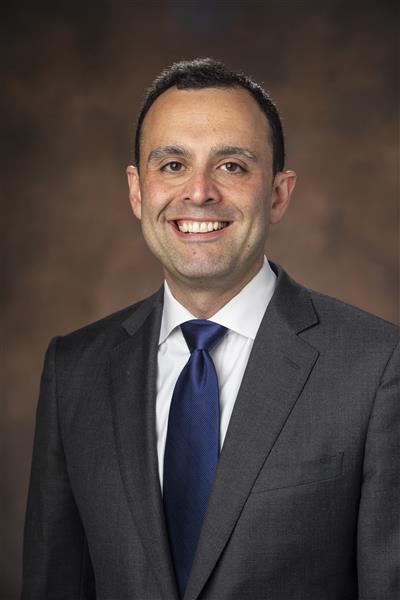Alex Jahangir, MD, MMHC
Crisis Management
Diversity in specialty, ethnicity strengthen crisis management

When combatting a pandemic, the first impulse may be placing public health or infectious disease specialists in charge.
In Nashville, though, that role fell to an orthopaedic trauma surgeon: VUMC’s Alex Jahangir, MD, MMHC. He is director of the Division of Orthopaedic Trauma and executive medical director of the Trauma Patient Care Center.
In March 2020 Jahangir became chair of the Metro Coronavirus Task Force, and the public face of the city’s COVID-19 response. The task force managed mask mandates, vaccination rollouts, and decisions about capacity restrictions in businesses and public spaces. Jahangir had been named chair of the Metro Board of Health just months prior. (With that title, it fell to him, under the city charter, to declare a public health emergency.) He stepped into the COVID spotlight despite his self-described inexperience dealing with the media and competing political agendas.
Rather than a liability, Jahangir’s medical specialty proved an asset.
“In the world of orthopedic trauma, we learn to be comfortable with uncertainty, and to make really hard decisions without knowing all the information,” he says. “As a trauma surgeon, you learn that you don't know everything and it's important to lean on colleagues, friends and subject matter experts,” Jahangir says. “You don't figure it out by yourself. Those skill sets actually allowed me to be more successful than perhaps a public health expert working in isolation and not used to regularly dealing with crisis situations.”
Tackling the pandemic, Jahangir tapped other experts: leaders of multiple Nashville hospitals, emergency response teams, public health professionals, lawyers, businesses and more. He invited internationally known immunologist James Hildreth, PhD, MD, president and CEO of Meharry Medical College (a historically Black medical college), onto the task force.
In addition to recruiting professional diversity, Jahangir kept ethnic and racial diversity in mind when strategizing how to communicate with and protect the city’s historically marginalized populations.
He feels personal connection to these groups. Jahangir’s family moved from Iran to Nashville when he was 6.
“When I moved to America, I received my vaccinations from the health department; I received my dental work from that same place,” Jahangir says. He attended a racially diverse high school. His father worked at Meharry. He points to the city’s cultural diversity: In 2020, Nashville’s population was 38% nonwhite, according to the Census Bureau; 13% of residents were born outside the U.S.
As a trauma surgeon, Jahangir witnesses health disparities daily. “Trauma is the great equalizer,” Jahangir says. “I have taken care of some of the most famous country singers in the world in a room immediately next to someone who's unhoused.”
His role on the Board of Health gave him additional perspective on health disparities within the city: “Somebody born in the same hospital as my daughter on the same day, who happens to live three miles north of me, will have 12 years less life expectancy.”
Jahangir knew that, like other medical issues, COVID would disproportionally affect those with the least access to quality care, who consequently had many chronic health conditions. The task force aimed to provide equitable COVID-19 testing in particular. Meharry ran the city’s testing sites – several situated in immigrant and Black neighborhoods -- for more than two years. The task force also worked with nonprofits serving diverse populations to educate the public about COVID-related precautions.
Jahangir notes some of the achievements resulting from this focus on diversity: Four months after vaccinations were available to those 55 and older, “we had 53% of our African American population over 55; 58% of our white population over 55; and 83% of people of Hispanic ethnicity over 55” vaccinated, Jahangir says – and this in a climate where many political leaders downplayed the pandemic and vaccine misinformation was rampant. Ultimately, Nashville saw more people vaccinated than other parts of the state and fewer COVID deaths than early models projected.
“That only happens,” Jahangir says, “because we build trust.”
